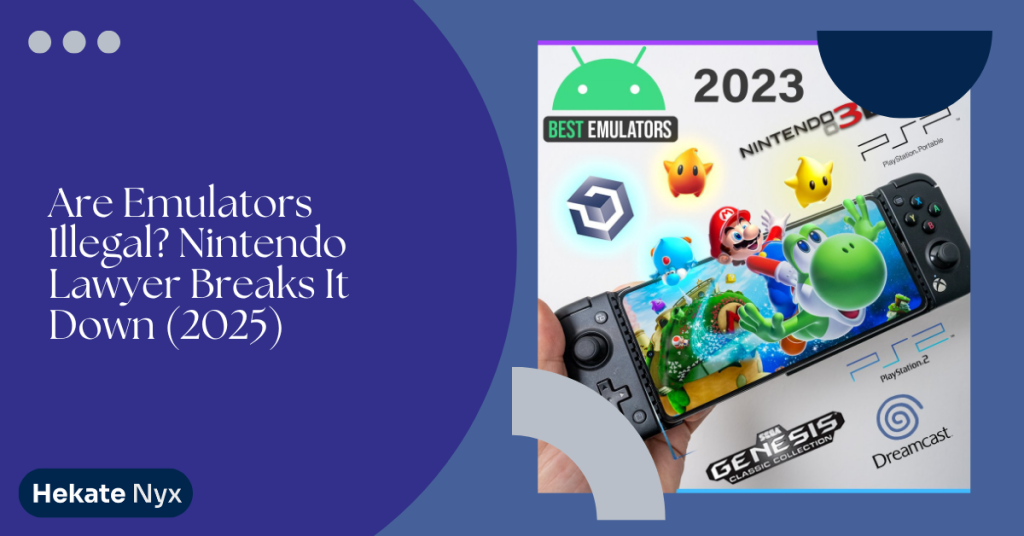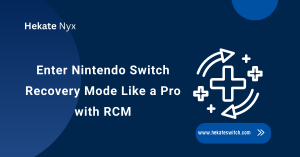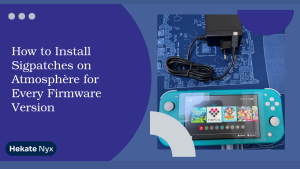Table of Contents
ToggleIntroduction To Emulation
Did you know that nearly 60% of gamers have used an emulator at some point in their lives? Crazy, right? I remember the first time I booted up an old Game Boy title on my PC—it was magical. It isn’t very clear. Was I a criminal or just nostalgic?
Are Emulators Illegal or Not? Here’s the simple answer: Emulators themselves aren’t illegal, but what you do with them can be.
If you’re still unsure whether you’re playing it safe or skating on thin legal ice, this article is exactly what you need. Skip it, and you might continue running emulators under risky assumptions, such as assuming all ROM downloads are safe.
I’ve written this because I’ve spent years navigating the wild world of ROMs, copyright claims, DMCA notices, and emulator forums. From studying real case law to analyzing Nintendo’s legal battles, this guide is backed by both research and real-world insights.
So, grab a coffee (or a legally owned cartridge), and let’s dive in. Oh—and don’t forget to comment your thoughts once we’re done!
Key takeaways:
- Emulators themselves are not illegal, but distributing ROMs usually is.
- Nintendo argues that emulators facilitate piracy and commercial harm.
- Legal gray areas exist, particularly around BIOS files and fair use.
- Preservation and consumer rights clash with intellectual property laws.
- Using official platforms like Switch Online is the safest legal option.
Understanding the Basics of Emulators
Emulators are software programs that mimic the hardware of video game consoles. They allow users to play games from older platforms like the NES, SNES, or Nintendo 64 on modern devices. Though they serve nostalgic and preservation purposes, their legality is often misunderstood due to their connection with game ROMs and BIOS files.
What Is a Video Game Emulator?
A video game emulator replicates the hardware of a console, letting games originally made for that console run on different platforms, such as PCs or smartphones. For example, Dolphin can emulate GameCube and Wii systems, providing access to games long since discontinued by Nintendo—similar to how tools like Hekate for Nintendo Switch OLED allow customized booting options on modded Switch consoles.
How Emulators Work on Different Devices
Emulators interpret the original game’s code and simulate the system’s behavior on a different machine. They are platform-agnostic in many cases, meaning they can run on Windows, Android, Linux, or macOS. Performance can vary depending on hardware and emulator optimization.
Popular Use Cases for Emulators Today
Gamers use emulators to revisit classics, create mods, or test homebrew games. Developers use them for quality assurance testing. Some fans even build portable handhelds with emulator software to create DIY retro consoles. These uses show emulators aren’t just for piracy.
Are Emulators Illegal? Legal Status of Emulators Under Copyright Law
Though emulators themselves aren’t inherently illegal, their use raises copyright issues, especially when ROMs or BIOS files are involved. The law varies by country, but in the U.S., the conversation often centers around intellectual property rights and fair use.
Are Emulators Themselves Illegal?
In most jurisdictions, simply developing or using an emulator is legal. Courts have upheld this view in several cases. The issue arises with how they are used. If someone uses an emulator with illegally downloaded ROMs, that can be a copyright violation.
BIOS Files and Their Legal Gray Areas
BIOS files are firmware required to boot some consoles. Distributing or using copyrighted BIOS without authorization is strictly prohibited and considered illegal. However, emulators that use clean-room engineering to replicate BIOS functionality may avoid infringement claims. Still, this remains a legal gray zone.
ROMs vs Emulators: What’s the Real Issue?
ROMs are digital copies of games. Downloading commercial ROMs without owning the physical copy is considered piracy. While emulators enable ROM use, they are not responsible for how users acquire those ROMs. The distribution of ROMs, not the emulator, is what breaks the law.
Fair Use and Backup Copies: What the Law Says
U.S. law allows making a backup copy of media you own for personal use. This suggests ripping your own ROM from a game cartridge might be legal. However, distributing that ROM is not. Fair use is subjective and typically interpreted in court.
Nintendo’s Legal Position on Emulators
Nintendo takes a hard stance against emulators, particularly those used in conjunction with pirated ROMs. Their legal team argues that emulators undermine their business and intellectual property. Recent high-profile takedowns reinforce this approach.
Why Nintendo Is Cracking Down
Nintendo claims that emulators encourage piracy, affecting their revenue and the integrity of their platform—similar to concerns raised around using Hekate Switch Sigpatches in modded systems.
What Nintendo’s Lawyers Are Saying
Nintendo’s legal representatives emphasize that emulators facilitate infringement, even if the software itself isn’t pirated. Their recent lawsuit against the Yuzu emulator points to the claim that enabling Switch game playback without Nintendo’s hardware is inherently damaging.
Notable Lawsuits and Takedowns
Nintendo has taken down ROM-hosting websites and filed legal complaints against emulator developers. Examples include lawsuits against Yuzu, Dolphin, and EmuParadise. These actions demonstrate Nintendo’s aggressive legal tactics to protect its IP.
Nintendo’s Statement on “Commercial Harm”
According to Nintendo, the unauthorized distribution of ROMs leads to “irreparable commercial harm.” They argue it devalues their properties and discourages legitimate sales of both retro and current titles. This forms the basis of their legal actions.

What Makes Emulators Risky to Use or Distribute
While running an emulator on your personal device isn’t risky in itself, distributing ROMs, BIOS, or emulator software bundled with infringing files can lead to serious legal consequences. This is where most emulator-related legal issues arise.
Legal Risks for Developers
Developers of emulators can be sued if their software is found to infringe on copyrighted code or if it’s bundled with illegal files. While clean-room development offers protection, it doesn’t always shield them from lawsuits or takedown demands. That’s why understanding tools like Fusee.bin vs Hekate differences is so important for anyone tinkering with Switch firmware.
Legal Risks for Users and Streamers
Users who download illegal ROMs or stream pirated content may face DMCA takedowns or bans on platforms like YouTube or Twitch. While rare, legal action against users is possible, particularly for repeat offenders or monetized piracy.
The DMCA and Circumvention Clauses
The DMCA prohibits the circumvention of DRM protections. Some emulators must bypass these systems to work, which may trigger DMCA violations. This is particularly relevant for consoles like the Switch, which use security measures to prevent unauthorized software.
The Debate: Preservation vs Piracy
The emulator debate often pits preservationists against copyright holders. Fans argue that emulators help save video game history, especially titles that are no longer sold or supported. Meanwhile, companies stress the need to protect their creations and profits.
Are Emulators Protecting Gaming History?
Many games from past decades are no longer available legally. Emulators offer a way to preserve and experience these titles. Archives and preservation groups argue they play a crucial role in digital heritage, especially for obscure or unreleased games.
The Ethics of Downloading Old Game ROMs
Some gamers believe downloading games that are no longer sold is morally justified, especially when no legal alternative exists. Others argue that piracy is still piracy, regardless of availability. This ethical gray area fuels the ongoing debate.
Community Reactions to Nintendo’s Enforcement
Fans are often critical of Nintendo’s aggressive takedowns. They argue that Nintendo could offer more legacy content legally rather than shut down fan efforts. Some communities respond by creating private networks or encrypted sharing systems.
Alternatives to Emulators: What’s Legal and What’s Not
There are legal ways to experience retro games, although options may be limited. Using platforms like Nintendo Switch Online or purchasing retro re-releases ensures compliance with copyright laws.
Legal Emulation via Nintendo Switch Online
Nintendo offers official emulators through its subscription service. Titles from NES, SNES, and N64 libraries are available, often with added features like save states. This is a safe and legal method to play classic games.
Buying Retro Games from Official Sources
Retro games are sometimes re-released as collections or remasters. Buying these supports developers and avoids legal risk. Platforms like the eShop, Steam, and GOG offer legitimate ways to enjoy older games.
Using Original Hardware with Flash Carts
Some users prefer using original consoles with flash carts, which load ROMs from SD cards. If the ROMs are backups of games you own, this method may fall within fair use. However, legality can vary based on jurisdiction.
Expert Insights and Legal Opinions
Legal professionals offer mixed opinions on emulators, often depending on how they’re used. Courts have generally protected the development of emulators while punishing those who distribute infringing content.
What IP Lawyers Say About Emulator Legality
Intellectual property lawyers confirm that emulators are not illegal by design. However, they caution that associated activities, like downloading ROMs or bypassing DRM, often cross into illegal territory.
Emulation in Court: Case Law Examples
Sony vs. Bleem! is a notable case where the court upheld the legality of emulation. The court found that reverse engineering for compatibility did not violate copyright. Such rulings support emulator development but don’t justify ROM distribution.
Can Open-Source Emulators Be Protected?
Open-source emulators offer transparency and cleaner legal records. Projects that steer clear of copyrighted code and avoid bundling ROMs are more defensible in court. However, they can still be targeted with DMCA claims or legal threats.
Final Thoughts on the Future of Emulators
We’ve unpacked the ins and outs of emulator legality—everything from copyright law to BIOS files, Nintendo lawsuits, and preservation ethics. If you’ve stuck around this long, you’re clearly someone who cares about gaming the right way.
Emulators are an incredible tool for gaming history and accessibility. But it’s vital to use them responsibly. Supporting legal channels while advocating for better preservation efforts is the best middle ground. I believe companies like Nintendo could benefit by working with emulator communities, not against them.
Read more of our articles on legal homebrew practices or using Hekate safely to learn how modding can stay fun and secure.
FAQs About Emulators and the Law
Can I go to jail for using an emulator?
Highly unlikely. Emulators aren’t illegal, but using them with pirated ROMs could result in legal consequences, especially if you’re distributing or monetizing them.
Is it legal to rip my own game ROMs?
If you’re making a personal backup from a game you own, it’s generally allowed under fair use. However, distribution is still illegal.
Are there any legal emulators I can use freely?
Yes! Open-source emulators that don’t bundle copyrighted files and are used with legally owned games are perfectly legal in most jurisdictions.
What if a game is no longer being sold?
Even if a game is “abandonware,” it still has copyright protection. Downloading it without permission is still piracy under most laws.
Read More:















